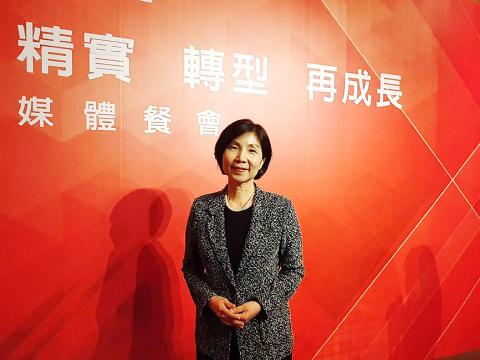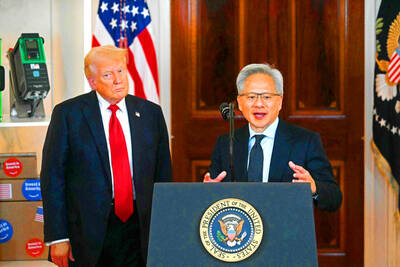Far EasTone Telecommunications Co Ltd (遠傳電信) aims to boost the revenue contribution of “new economy” services to 20 percent over the next three to five years to limit the impact of eroding traditional services, the telecom said yesterday.
To stem a revenue slide, Far EasTone last year set up a “transformation office” to step up overhaul efforts, as the company looks primarily to “new economy” services — businesses related to big data, artificial intelligence and the Internet of Things (IoT) — to increase revenue sources.
Leveraging those technologies, Far EasTone provides cybersecurity solutions, cloud-based solutions and IoT services for enterprise customers, as well as digital services such as online music streaming and mobile commerce for consumers, the company said.

Photo: CNA
“In Taiwan, traditional telecom service revenue began sliding in 2015. From 2016 to 2017, telecom services in Taiwan fell 3 percent,” Chee Ching (井琪), Far EasTone’s new president and acting head of the transformation office, told the media yesterday.
The company’s revenue unexpectedly fell at a faster rate last year, more than 5 percent year-on-year, after the nation’s biggest telecom operator, Chunghwa Telecom Co (中華電信), triggered a major price war by slashing the threshold for 4G subscription services to NT$499 a month.
The extremely low flat rate cut into the financial performance of every telecom last year, Ching said, adding that the nation’s “major players feel the need to transform themselves and speed up their efforts.”
“Regarding transformation, we do not intend to shed our role of being a traditional telecom service provider, but we intend to go beyond that role. We want to offer more services than just offering SIM cards and mobile phones,” she said.
Far EasTone expects the contribution from its “new economy” businesses to increase to 13.5 percent of total service revenue this year, from 10 percent last year, thanks to growing Internet traffic, rising demand for curbing cyberattacks and local manufacturers’ increasing desire to improve efficiency and cut costs by adopting automation systems, she added.
“The nation’s IoT market is just waking up,” Ching said. “The pie will grow to 20 percent within three to five years.”
By that time, the percentage of Far EasTone’s technicians employed in “new economy” services would rise to 30 percent, from 20 percent now, she said.
Asked about the price war, Ching said that “it was not our strategy to start a price war.”
The price war “will eventually die down,” she said, adding that recent low-price promotions by local rivals have interested fewer consumers.

Taiwan Semiconductor Manufacturing Co (TSMC, 台積電) last week recorded an increase in the number of shareholders to the highest in almost eight months, despite its share price falling 3.38 percent from the previous week, Taiwan Stock Exchange data released on Saturday showed. As of Friday, TSMC had 1.88 million shareholders, the most since the week of April 25 and an increase of 31,870 from the previous week, the data showed. The number of shareholders jumped despite a drop of NT$50 (US$1.59), or 3.38 percent, in TSMC’s share price from a week earlier to NT$1,430, as investors took profits from their earlier gains

AI TALENT: No financial details were released about the deal, in which top Groq executives, including its CEO, would join Nvidia to help advance the technology Nvidia Corp has agreed to a licensing deal with artificial intelligence (AI) start-up Groq, furthering its investments in companies connected to the AI boom and gaining the right to add a new type of technology to its products. The world’s largest publicly traded company has paid for the right to use Groq’s technology and is to integrate its chip design into future products. Some of the start-up’s executives are leaving to join Nvidia to help with that effort, the companies said. Groq would continue as an independent company with a new chief executive, it said on Wednesday in a post on its Web

CHINA RIVAL: The chips are positioned to compete with Nvidia’s Hopper and Blackwell products and would enable clusters connecting more than 100,000 chips Moore Threads Technology Co (摩爾線程) introduced a new generation of chips aimed at reducing artificial intelligence (AI) developers’ dependence on Nvidia Corp’s hardware, just weeks after pulling off one of the most successful Chinese initial public offerings (IPOs) in years. “These products will significantly enhance world-class computing speed and capabilities that all developers aspire to,” Moore Threads CEO Zhang Jianzhong (張建中), a former Nvidia executive, said on Saturday at a company event in Beijing. “We hope they can meet the needs of more developers in China so that you no longer need to wait for advanced foreign products.” Chinese chipmakers are in

POLICY REVERSAL: The decision to allow sales of Nvidia’s H200 chips to China came after years of tightening controls and has drawn objections among some Republicans US House Republicans are calling for arms-sale-style congressional oversight of artificial intelligence (AI) chip exports as US President Donald Trump’s administration moves to approve licenses for Nvidia Corp to ship its H200 processor to China. US Representative Brian Mast, the Republican chairman of the US House Committee on Foreign Affairs, which oversees export controls, on Friday introduced a bill dubbed the AI Overwatch Act that would require the US Congress to be notified of AI chips sales to adversaries. Any processors equal to or higher in capabilities than Nvidia’s H20 would be subject to oversight, the draft bill says. Lawmakers would have